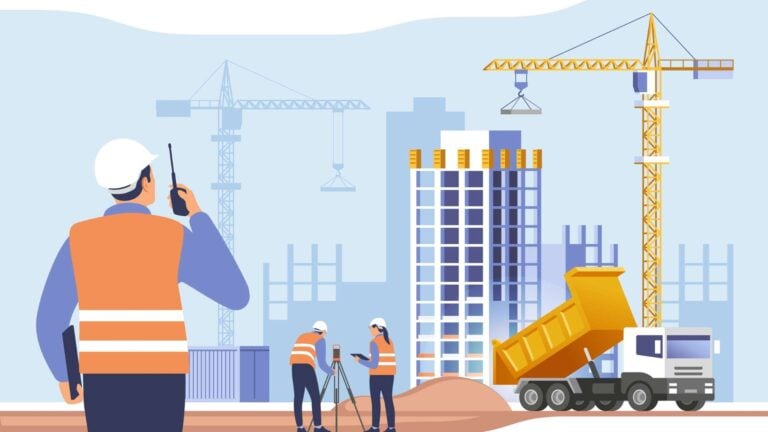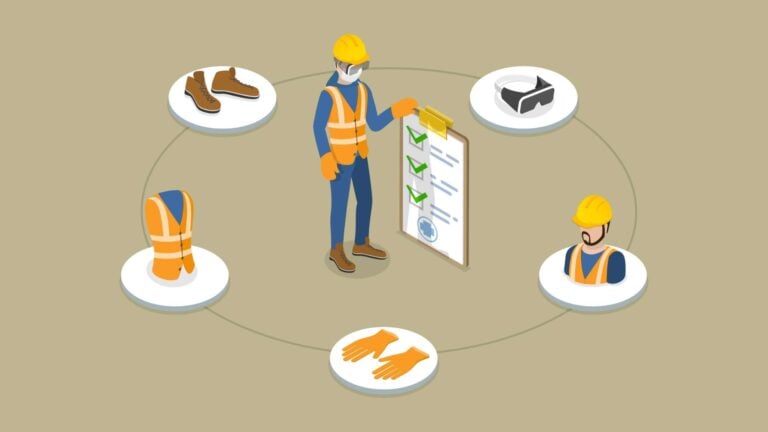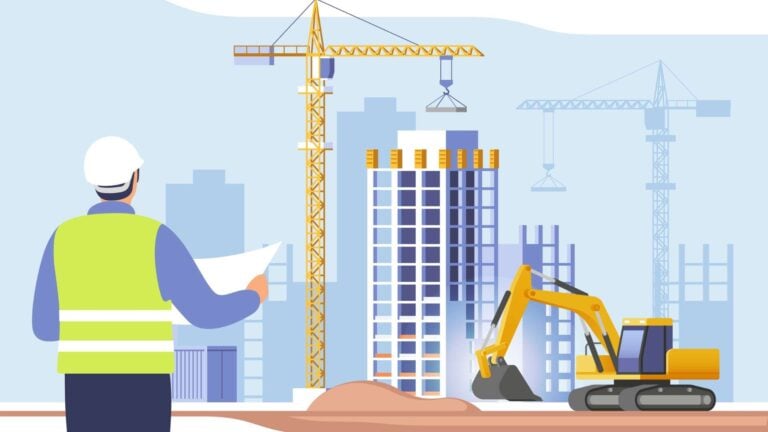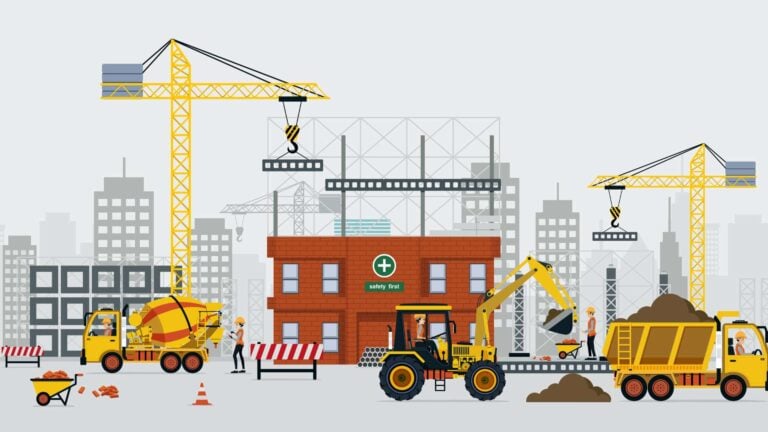Learn about the key duties, responsibilities, and qualifications that should be in a construction worker job description and use our job description template for your hiring.
Construction workers (often called construction laborers) are the unsung heroes of any construction site.
Their hard work, dedication, and diverse skills breathe life into blueprints, transforming them into the buildings we see every day.
But what exactly does a construction worker do? What kind of skills and qualifications are needed to thrive in this dynamic field?
Construction Worker Job Description Template
>> Download this template for your hiring. <<
[BUSINESS NAME] is looking for a hardworking and skilled Construction Worker to join our team. Reporting to the Site Supervisor, the successful candidate will be responsible for performing various tasks to assist in the construction of structures and buildings. The ideal candidate will have physical stamina, a strong work ethic, and previous experience in construction.
Job Responsibilities:
- Assist in the preparation of construction sites by clearing debris and setting up materials
- Operate and maintain construction equipment and machinery
- Load and unload construction materials
- Perform physical labor tasks such as digging, lifting, and carrying
- Follow instructions from supervisors to complete tasks
- Measure, cut, and shape materials to specifications
- Install and assemble structures and fixtures
- Help with the installation of systems such as plumbing, electrical, and HVAC
- Ensure all work is done in compliance with safety regulations and guidelines
- Clean and maintain tools, equipment, and work areas
- Report any issues or hazards to the supervisor
- Work collaboratively with other team members to meet project deadlines
Qualifications and Skills:
- High school diploma or GED
- 2+ years of experience as a construction worker
- Ability to operate construction tools and equipment
- Knowledge of safety procedures and regulations
- Physical stamina and strength to perform heavy labor tasks
- Strong attention to detail and accuracy
- Good communication skills and ability to follow instructions
- Reliable and punctual with a strong work ethic
- Ability to work independently and as part of a team
- Basic mathematical skills to measure and calculate materials
- Valid driver’s license and reliable transportation
Working Hours:
- Full-time, year-round
- Mon–Fri 7:00am–4:00pm
- Overtime is available but not required
Compensation:
- $20–25/hour (based on experience)
- Health insurance, including dental and vision
- Paid holidays, time off, and parental leave
- 401(k) matching and life insurance
This position will require a background check upon hire.
About Us:
[Company Name] is a leading construction company in [City/Region], building high-quality [type of projects your company builds]. We’re looking for a reliable and hardworking Construction Worker to join our team and play a vital role in bringing our projects to life.
To Apply:
Please submit your resume and cover letter to [email protected]
We are an equal-opportunity employer and value diversity at our company. We do not discriminate on the basis of race, religion, color, national origin, gender, sexual orientation, age, marital status, veteran status, or disability status.
This Might Interest You
Read our in-depth guide about the best construction management software solutions.
What Does a Construction Worker Do?
Construction workers are the backbone of the construction industry.
They perform a variety of tasks to help bring blueprints to life, from assisting skilled professionals to independently handling specific duties.
Here are some common duties and responsibilities:
Site Preparation
- Clear and prepare construction sites by removing debris, trees, and other obstructions
- Load/unload construction materials from delivery trucks
- Set up safety barriers, signage, and temporary structures like scaffolding
Construction Labor
- Assist skilled tradespeople like carpenters, masons, and electricians
- Perform physical labor tasks like digging trenches, mixing concrete, erecting scaffolds
- Operate basic construction equipment like jackhammers, compactors, and small earthmovers
- Load/unload and transport construction materials around the site
Building Construction
- Measure, cut, and install construction materials like wood, metal framing, drywall, etc.
- Assist with pouring and leveling concrete for footings, slabs, or structures
- Help position and secure concrete forms, rebar, and other reinforcements
- Perform basic masonry work like laying bricks or blocks
Site Maintenance
- Control construction site traffic in compliance with safety regulations
- Erect/dismantle temporary structures and site security fencing
- Clean up debris and trash from construction areas
- Conduct basic maintenance on construction tools and equipment
Safety
- Follow all site safety protocols, guidelines, and OSHA regulations
- Use proper personal protective equipment (PPE) like hard hats, gloves, steel-toe boots
- Help set up safety lines, nets, and other fall protection systems
This Might Interest You
Search our library of safety checklists and templates to use on your construction site and keep everyone safe and compliant. Or read our in-depth guide on the best construction checklist apps.
Construction workers perform a wide range of vital support tasks on job sites to facilitate and enable the completion of construction projects by skilled tradespeople.
Skills and Qualifications:
- Physical fitness is essential. Construction work is demanding and requires the ability to lift and carry heavy objects, sometimes exceeding 50 lbs. Stamina and endurance are necessary for long workdays.
- Safety awareness and a commitment to following safety protocols are paramount.
- Excellent communication and teamwork skills are crucial for collaborating effectively with colleagues and supervisors.
- A positive attitude, reliability, and a willingness to learn are highly valued traits in construction workers.
- While a high school diploma or equivalent is often preferred, some companies may welcome candidates with a strong willingness to learn and a demonstrably hard work ethic.
Salary Expectations:
Construction worker salaries can vary depending on experience, location, and the specific company.
Salaries for construction workers vary based on several key factors:
- Job Role: Entry-level construction workers and laborers typically earn lower salaries compared to skilled trades. According to the US Bureau of Labor Statistics (BLS), the median annual wage for construction laborers was $38,030 in May 2022.
- Experience: As with most professions, more experienced construction workers and those with specialized skills or certifications can command higher salaries compared to entry-level or less experienced workers.
- Location: Construction worker salaries can vary significantly based on the geographic location and the cost of living in a particular area. For example, construction workers in major metropolitan areas like New York City, San Francisco, or Boston generally earn higher salaries compared to those in smaller cities or rural areas.
- Industry Sector: The specific construction industry sector can also influence salaries. Workers in sectors like commercial construction, infrastructure projects, or energy construction may earn higher salaries compared to residential construction due to the complexity and scale of the projects.
This Might Interest You
Check out our article on 35+ Types of Construction Jobs with Responsibilities & Salaries to give you more insights.
Education and Training Requirements:
Formal education beyond high school is typically not required for entry-level construction worker positions.
However, some companies may prefer candidates with vocational training or certifications in specific areas like carpentry, welding, or operating heavy machinery.
Training for construction laborers usually occurs on the job through informal apprenticeships.
New workers are likely to undergo basic safety training provided by their employer, covering areas such as equipment operation, blueprint reading, and proper tool usage.
More experienced construction workers often mentor new laborers, offering hands-on guidance and instruction.
Some employers may also provide short formal training programs for entry-level workers.
While basic construction worker roles usually don’t need specific licenses or certifications, having certifications like OSHA safety training can enhance a candidate’s attractiveness to employers.
Did You Know?
Connecteam’s employee training feature lets you create engaging and bite-sized training sessions in just a few minutes. You can then distribute the lessons to your entire team with just a click and check their knowledge with a quick quiz. The dashboard will show you exactly who took the training, who passed the test, and who needs more support.
Get started with Connecteam for free today!
Experience Requirements:
Entry-level construction worker positions may require no prior experience, especially if the company offers training programs.
However, some employers may prefer candidates with at least a few months or a year of experience in general construction work.
FAQs
What skills are essential for a construction worker?
Essential skills for a construction worker include physical stamina and strength, as the job often involves heavy lifting and long hours. They should also have a good understanding of safety practices to minimize risks on the job site. Basic skills in using hand and power tools, understanding blueprints and measurements, and effective communication are also crucial. Additionally, adaptability and problem-solving skills are important due to the dynamic nature of construction projects.
Are there specific educational requirements for becoming a construction worker?
While formal education beyond a high school diploma or GED is not typically required, some vocational training or courses in areas such as carpentry, welding, or construction safety can be beneficial. Many construction workers receive on-the-job training through informal apprenticeships. Certifications, such as OSHA safety training, can enhance employability and safety knowledge on the job site.
What are the typical duties of a construction worker on a job site?
A construction worker’s duties can vary widely but generally include preparing and cleaning the construction site, loading and unloading materials, assisting skilled tradespeople, and performing basic tasks such as digging, mixing concrete, or erecting scaffolding. They may also be responsible for operating construction equipment under supervision. Ensuring safety compliance and reporting any issues to the site supervisor are also key responsibilities.




